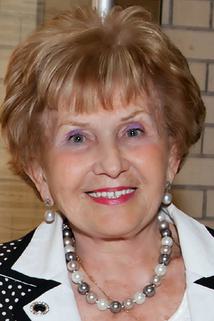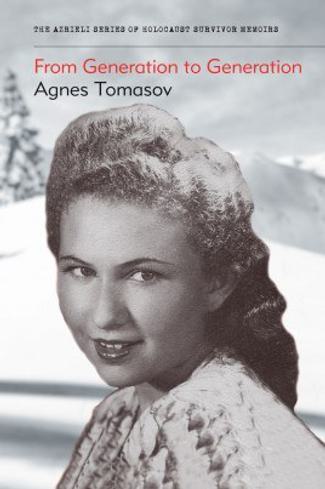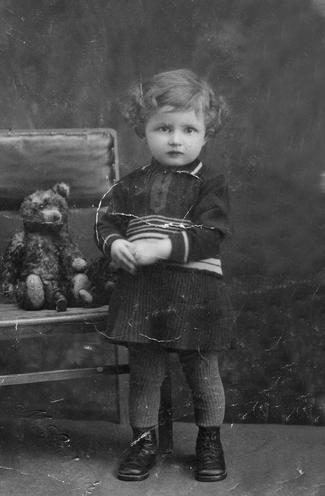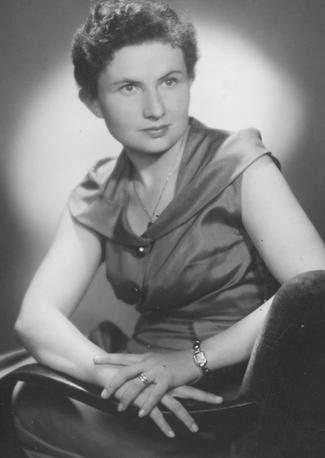From Generation to Generation
Agnes Tomasov
Hiding from the Nazis in the forests of Slovakia’s Low Tatra Mountains in the fall of 1944, in constant danger from the Germans occupying nearby villages, fourteen-year-old Agnes Grossmann and her family make the daring decision to escape high into the mountains and hike along treacherous ice-covered peaks to safety. Twenty-four years later, Agnes Tomasov – now married with two children – finds herself on the run from post-war Czechoslovakia’s Communist regime and defects to Canada with her family, carrying only what they can fit in two suitcases. Her sweeping memoir of life under two totalitarian regimes is an extraordinary and inspiring tale of courage, love and hope in the face of tragedy. Imbued with the author’s warmth, unflagging resilience and determined independence, From Generation to Generation is a true testament to the strength of the human spirit.
Introduction by Harold Troper
- En bref
- Slovaquie
- Clandestinité
- Tchécoslovaquie d’après-guerre
- Vie en pays communiste
- Immigration au Canada en 1968
- Adaptation à la vie canadienne
- Épouse de Joseph Tomasov, publié dans la Collection Azrieli
240 pages
Médaille d’argent 2011 décernée lors des Independent Publisher Book Awards en 2011
From Generation to Generation
Survival in the Mountains
October 26, 1944, was a cool, rainy day in Kľačany. I was playing with my skipping rope when all of a sudden I heard my stepmother screaming that we had to run. We could hear bombs exploding in the distance. I panicked; everybody around me, including villagers with their cattle, began running to the forest. Instead of going inside for my warm coat, I grabbed only Ivan’s hand. My stepmother and step-grandmother followed and we ran deep into the forest.
We met Slovak partisans in the forest who told us that the villagers could return home, but that the Jews should stay. The partisans forced open a cottage and told the women and children to go in. We were wet, tired, hungry and pressed together like sardines. I fell asleep and had a dream in which I saved our family. I dreamt about my little green room in Bardejov, where it was nice and warm. I wanted to go into my room through a cold corridor when somebody grabbed my shoulder. It was a woman dressed like a nun and she told me not to go into my warm room, but to stay in the cold corridor. I asked, “Who are you to tell me such nonsense?” She replied, “I am your mother and I am watching over you.” I opened my eyes and felt my stepmother’s hands shaking my shoulder. She was shouting at me, “Wake up! It’s already dark outside. Grandmother wants to go back into the village and we have to join the other people who are going back.” I told her about my dream. A lady by the name of Mrs. Erdelyi was listening and said, “Sarolta, it is an omen. Don’t go back. We are staying too — let’s all stay until the morning.” My stepgrandmother was furious, calling my dream ridiculous. “Instead of going to my bed,” she argued, “I have to stay in this horrible place?”
We later heard that some of the Jews who had returned to Kľačany had been shot by the German soldiers who were guarding the entry into the valley. If not for my dream, we would all have died. My stepmother was very grateful for my dream and told everybody after the war about this story. For me, this incident confirmed for me what I had always known — that my darling mother was, is and always will be watching over me.
It turned out that my father had foreseen difficulties ahead. During one of his visits from Bardejov, he told me and Ivanko a huge secret. He had brought four brushes for clothes-cleaning with him, and embedded inside the brushes were plates of twenty-four-carat dental gold. Should it become necessary, we were to use the gold to save our lives. Fortunately, my stepmother had taken them with her when we escaped into the forest.
The morning after my dream, we were woken up by a very loud explosion. The partisans advised us to run even deeper into the forest because the German soldiers were getting closer. The villagers had already built several underground bunkers to sell to the Jewish refugees. My stepmother gave the first brush filled with gold as payment for our family to have accommodations in one of the bunkers. Several other Jewish families — including four members of the Svarin family, the five Landesmanns, the five Lippas, the five Erdelyis, and some other families — shared our bunker.
A total of twenty-nine people were crammed into a very small space. The bunker was camouflaged into the terrain so as not to be visible from the outside. It was approximately three metres by five metres. It had hardly any ventilation, just a small door that could be opened to get in and out. We slept on wooden bunk beds squeezed tightly together. We had no food supply. The first three days, when we had no food at all, Ivanko found a piece of bacon skin that had probably been thrown out by forest labourers. He and I chewed on it for two days. We melted snow for water, so at least we weren’t thirsty. After three days, we found horses frozen in the forest. The partisans had brought the horses with them from the uprising, but since they couldn’t feed them, they left them to freeze to death. Horsemeat was a huge luxury. Villagers often brought potatoes to the bunkers — which they sold to us at a very high price — and they also brought us a steel kettle so that we could cook inside the bunker on an open fire, which was also our only source of heat. Women cooked on the open fire once a day and everybody got a small portion of the food.
Not far from us was a larger bunker that was the headquarters of the partisan military unit. A doctor from the partisan headquarters warned us of the danger of a typhus outbreak and, therefore, to not use unclean melted snow for drinking water. We went out to look around and found several other bunkers containing Jews scattered around the forest within approximately fifteen minutes walking distance from each other. After a few days of confusion, rules had to be established for the cohabitation of so many people, and a leader, Frankl from Prešov, was chosen to represent all the Jews. A number of rules were set, including one that three times a day we had to bring water for cooking and drinking from a creek fifteen minutes away.
Because we didn’t have our father with us, all this work was piled up on me. My stepmother, who was thirty-eight at the time, declared that she and her mother were too old to do such hard work. Ivanko was only ten, so it was left to me, at fourteen, to go with the rest of the men from the bunker to bring water and wood for cooking and heating.
We were still able to maintain contact with the villagers and they would let us know whenever the Germans pulled out of the village for a few days. This gave us an opportunity to bring some bread, potatoes and apples from the village. It was my responsibility to go with the men on this three-hour walk to the village. I continued to do this throughout the bitterly cold winter from October to March. I also had to carry the very heavy load of food to the bunker on my back. My stepmother never offered to go in my place. When the people from the bunker said to her, “You should go instead of this child,” her excuse was that if the Germans caught her, her dark colouring made it more likely that they would suspect that she was Jewish.
During my first expedition, I went to our previous apartment to bring back a goose-feather duvet to help ease the frigid temperatures at night. My family was delighted that I had brought it back, but I never got to enjoy it. They covered themselves, not leaving enough of the duvet for me. I cried, asking my own mother to save me. The other people in our bunker were outraged at my stepmother’s behaviour, and promised me that if we survived the war, they would tell my father what happened.
Every day we suffered from lice, hunger and cold. One day, as usual, I went with the men to get water. We would always see fresh footprints in the snow from the neighbouring bunker, but on this particular day, I saw only my friend Alice from one of the other bunkers, and no other footprints. The adults I was walking with said, “Maybe they’re still sleeping.” At noon, when we went out for the second time, we noticed there were still no footprints, so we went to see what was going on. The sight that greeted us was the most horrific I’ve ever seen: the doors to the bunker were open, and approximately ten feet from the bunker were the dead bodies of the families living there — sixteen children, parents and grandparents, who had probably been killed the evening before. All the bodies were already covered with snow.
In a panic, we ran from the bunker to the partisan headquarters. The partisans knew that the military gangs operating under the direction of former Red Army general Andrei Vlasov, who collaborated with the Germans, had committed many similar atrocities, and thought that this may have been some of his work. Now we knew that we had additional enemies among us and relied on the partisans to protect us. Among them were a few Jewish partisans who didn’t disclose their origins because of the strong antisemitism among their Slovak group. These undercover Jewish partisans came to the bunkers to help us. They wanted to supply us with handguns for protection against Vlasov’s forces, but none of the seven adult men from our bunker knew how to handle a gun. Instead, two men stood on guard every night. If they suspected any danger, one of them would run to the headquarters. It was a harrowing time.
*Si vous êtes enseignant au Canada, vous pouvez commander gratuitement les ressources ici.

À propos de l’autrice
Agnes Tomasov est née le 16 juin 1930 à Bardejov (Tchécoslovaquie, aujourd'hui en Slovaquie). En 1968, elle, son mari et leurs deux enfants ont fui le régime communiste tchécoslovaque pour venir au Canada, où ils se sont installés à Toronto.
The mountains were almost 2,000 metres high….We had to climb to the peaks, where it was frozen and slippery. One single misstep could mean certain death.




